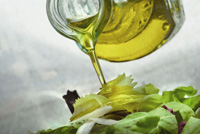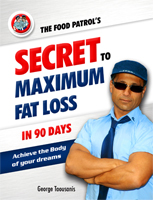Kate Troup What Fats You Should Eat Interview

Kate Troup What Fats You Should Eat Interview
The debate over fat is hot and heavy at the moment. It's got us all thinking could butter really be the next super-food? Australian Naturopath, Kate Troup believes that 'eating plenty of healthy fats can encourage weight loss and produce optimum health, it's just knowing which fats you can benefit from that matters".
What Fats You Should Eat:
Full fat dairy such as butter, milk and cheese
Olive oil and avocados
Coconut oil
Grass fed meat such as lamb and beef
Raw nuts and seeds
Why these fats are better?
Fats actively promote a stable metabolism
The oleic acid in avocadoes can help reduce cholesterol levels
Coconut oil protects against insulin resistance, reducing the risk of type 2 diabetes.
Grass fed animals are healthier due to not being fed corn with is high in starch, low in roughage and a poor source of calcium and magnesium
Raw nuts are an excellent natural source of protein
Interview with Kate Troup
After 20 years of clinic experience and research, Kate has launched weight-loss program W8less (http://www.w8less.com.au/) which focuses on a holistic approach to returning balance into your life, diet and fitness routine.
Question: What fats should we be eating?
Kate Troup: All of them! Fat is a natural part of your diet and is an essential component of your body.
Question: What is the difference between good and bad fats?
Kate Troup: In the past, the fats found in plants were thought to be good and animal ones bad, but research (and common sense) shows that isn't the case. All natural fats are good but the unnatural ones produced when vegetable oils undergo a process called hydrogenation are really bad. These trans-fats have been shown to increase the risk of heart disease by triggering inflammation and having a negative effect on cholesterol plus are linked with the development of diabetes, Alzheimer's disease, weight gain and depression. Many countries around the world have already banned the use of trans fats in food.
Question: What foods should we eat to incorporate fat into our diets?
Kate Troup: Some of the best foods to eat are raw nuts, eggs, avocado, coconut oil, oily fish, dairy and grass fed meat.
Question: How do eating healthy fats encourage weight loss?
Kate Troup: Fat is used to make hormones in your body so it's possible that eating more fat helps to address underlying hormonal imbalances, but the main benefit is that fat makes you feel full. When you eat fat, a hormone called oleoylethanolamide is released from your stomach and travels the part of your brain that tells you that you've had enough to eat. This has both an immediate effect on reducing the amount that you eat plus keeps you feeling full for longer.
This effect was recently demonstrated in research which showed that eating half an avocado at lunch time made people feel 40% less hungry three hours later.
Diets high in fat also have less impact on blood glucose and insulin spikes, which means that your body is less likely to store the energy from food as fat.
Fat can and will still be stored as body fat if it isn't used as energy. If you want to have a high fat diet, then you need to decrease carbohydrates at the same time.
Question: How can these good fats reduce cholesterol levels and the risk of type 2 diabetes?
Kate Troup: Good fats don't necessarily reduce overall cholesterol, but rather prevent it from oxidising. Keep in mind that cholesterol is an essential fat in your body and the building material for hormones and cell membranes. We need and want cholesterol, but want you don't want is for it to oxidise in the same way that an oil will become rancid. The monosaturated fats found in avocado and olives do encourage the production of more HDL, your good cholesterol as do the medium chain fatty acids found in coconut oil.
Eating a diet higher fat seems to reduce the risk of diabetes through preventing spikes in glucose and insulin. In the long term this would potentially preserve the function the pancreas gland which makes insulin and the sensitivity of the receptors on cells which use it.
Question: Can we eat too much healthy fats?
Kate Troup: Yes, I think it's possible to eat too much of any food but generally it's pretty hard to overeat good quality sources of fat. It's only when fat is mixed in with sugar, for instance ice cream, that the appetite centre in your brain goes into overdrive.
It's also worth noting that the field of nutrigenomics, which studies how food turns on and off our genes, suggests that some people are better suited to a high fat than others.
Question: Can you talk us through why grass fed meat is better?
Kate Troup: Grass fed meat has a much healthier range of fats, especially one called conjugated linoleic acid which is thought to play a role in cancer prevention, and omega 3. It also contains more antioxidants and contains pre-cursors to vitamins E and A. Cows have evolved to eat grasses and not grains so it makes sense that their meat is healthier when they do.
Question: Can you talk us through the perfect daily serving size for avocado and nuts?
Kate Troup: Once you're on a more balanced diet that contains plenty of good fats and fewer carbohydrates, your body will dictate the appropriate serving size through regulating your appetite. Until that happens though, half an avocado and a small handful of nuts is the perfect amount.
Question: What are your thoughts on the keto diet?
Kate Troup: The keto diet is really effective for most people, but it's inherently unsustainable. Most people can't eat a healthy amount of vegetables for instance and still stay in ketogenesis. I am also against people losing weight too quickly because that can permanently slow down their metabolism.
Question: What are the top five tips you give your clients?
You need to slip weight loss under your body's radar: if it clocks on to what's happening, it will slow down your metabolism so you burn less fat and produce hormones to make you hungry! Less is more when it comes to permanent weight loss.
Always think 'can I add a vegetable to this?". Veggies are the single most important part of your diet and you can always be eating more.
It's not the calories in food which is important but the hormonal response which they generate. Sugar and most carbohydrates generate a fat storage message whereas protein and fat are less likely to.
Go to bed! There is nothing on happening on your ipad or TV that is more important than getting a good night's sleep.
Interview by Brooke Hunter
Have You Seen This?
MORE







